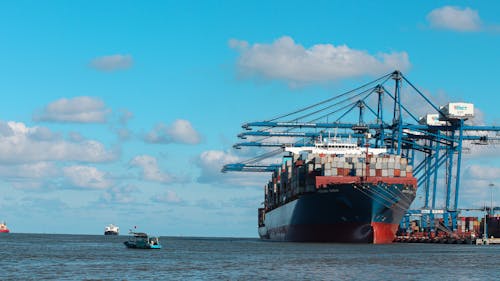SUBRAMANIAN: We must repeal Jones Act
Column: Whadda I Know

There is currently a law on the books that makes it harder for roads to be safe, artificially increases the price of common goods — like gas and food — and has crippled the state of shipping in the U.S. The impact of this law cannot be overstated, but it is shocking that many Americans are unaware of its existence.
This is the Jones Act, and it needs to be repealed.
In 1920, Congress passed the Merchant Marine Act. Section 27 of this bill is called the Jones Act. This law is responsible for handling issues related to cabotage, the transportation of goods between two ports in the same country.
Specifically, the Jones Act requires vessels operating in the U.S. between ports to be using ships built in the U.S. and owned and operated by Americans. The main purpose of this bill initially was to support the U.S. shipping industry after World War I. This bill has been strengthened many times in Congress since its inception.
For example, in 1940, Congress strengthened the Jones Act to include towing and salvage boats. The most recent example of the Jones Act getting reinforced was in 1988 when Congress required valueless materials being shipped across the water to be transported in a Jones Act-certified vessel.
The problem with this law is that its protectionist nature has caused many failures. One of the most significant problems is that it has handicapped effective responses to natural disasters.
During the 2014 Nor'easter, New Jersey needed road salt to ensure drivers could travel safely. But a shipment of road salt from Maine was delayed because the ship was not Jones Act-qualified. As a result, New Jersey faced a shortage of road salt, and many local roads were left without this crucial resource.
More recently, after Hurricane Maria, the Jones Act prevented vital shipments of food and supplies to the area. This, among other factors, led to 69 percent of Puerto Rican farmers experiencing one month of food insecurity and 38 percent facing persistent food insecurity.
Eventually, former President Donald J. Trump's administration granted a waiver to the Jones Act to aid in recovery efforts, but the issue would have been nonexistent if not for the Jones Act. These waivers have to be granted by the Secretary of Homeland Security, and that process usually only waives the restriction for 10 days. It can also be further constrained to a certain number of ships for "national security" purposes.
Given that pervasive climate change is likely to increase these extreme weather events, the U.S. must be able to respond effectively and swiftly to these crises. The Jones Act actively prevents this from happening.
The problem with the Jones Act goes beyond responses to natural disasters and into the day-to-day lives of American citizens. Due to the Jones Act, bringing in gas from states like Alaska or Texas is more expensive. This means that the gas prices in New Jersey continue to increase.
The law is hurting consumers. Fifty-eight percent of respondents say that it is difficult for them to pay for gas, according to a Monmouth University poll. Research from Maritime Economics & Logistics found that, from 2006 to 2017, maintaining the Jones Act cost New Jersey $50.89 million annually, culminating in a total deficit of $61 million.
The Jones Act does not even serve its intended purpose of bolstering the U.S. shipbuilding industry. The number of Jones Act Oceangoing ships has decreased from 434 in 1950 to 99 in 2018, according to the Congressional Research Service. This drastic drop has been caused by U.S. shipbuilding companies not having to compete with other foreign firms, building a level of complacency and artificial restrictions on supply.
What is worse is that many of the ships in the fleet are extremely old and likely could not pass the same safety checks that modern ships pass. Many of these older ships are also more prone to accidents.
Thanks to the Jones Act, 300 shipyards have closed, limiting the number of ships that can be added to the fleet. Of the remaining shipyards, only 25 can produce "naval ships and submarines, ocean-going cargo ships, drilling rigs and high-value, high-complexity mid-sized vessels." This means that the U.S. shipping industry has been effectively destroyed by the oligopolistic control set by the Jones Act.
The existence of the Jones Act makes life harder for Americans living both in and out of the continental U.S. With inflation still high, finding ways to make living affordable will be key in ensuring Americans can get through these difficult economic times. Repealing this outdated, protectionist legislation will ensure that Americans can get goods more easily.
Luckily, there has been some progress. In the 117th Congress, Sen. Mike Lee (R-Utah) introduced the Open America's Water Act, which would have repealed the protectionist parts of the Jones Act. Getting this legislation passed is definitely not going to be easy, given President Joseph R. Biden Jr.'s backing of the Jones Act, but it is nonetheless the right course of action for this nation.
But hey, whadda I know?
Kiran Subramanian is a senior in the School of Arts and Sciences majoring in economics and political science. His column, "Whadda I Know," runs on alternate Wednesdays.
*Columns, cartoons and letters do not necessarily reflect the views of the Targum Publishing Company or its staff.
YOUR VOICE | The Daily Targum welcomes submissions from all readers. Due to space limitations in our print newspaper, letters to the editor must not exceed 900 words. Guest columns and commentaries must be between 700 and 900 words. All authors must include their name, phone number, class year and college affiliation or department to be considered for publication. Please submit via email to oped@dailytargum.com by 4 p.m. to be considered for the following day's publication. Columns, cartoons and letters do not necessarily reflect the views of the Targum Publishing Company or its staff.



